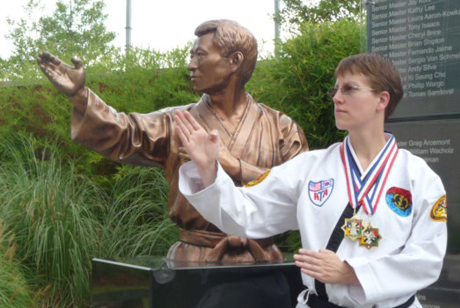(Photos courtesy Sarah Perry)
An engineering postdoc and tae kwon do world champion puts another notch in her black belt.
Sarah Perry won a tae kwon do world championship last month, but her most satisfying event at the tournament might have been one she lost. At this time last year, Perry was recovering from surgery to repair a torn knee ligament suffered while teaching a tae kwon do class. After several idle months she returned, gingerly, to training in the fall, discovering that the injury would not hinder her creative routines.
The freestyle nature of those routines—as opposed to traditional, choreographed events and sparring—allowed Perry to adapt them to her repaired knee, which she did well enough to be judged the world’s best among women ages 30–39 at the American Taekwondo Association championships in Little Rock, Arkansas. But Perry, a postdoc in the Institute for Molecular Engineering, only now feels herself returning to form in the other routines, which were more difficult for her at the world championships. “Having won the creative events, which is something that I could kind of tailor to my limitations, I really, really would like to do better this next year in the traditional events,” says Perry, a fifth-degree black belt. “I don’t know if I can win, but I’d like to be able to try and place.”

Training four or five times a week, she has good and bad days in pursuit of that goal. A defeat at the world championships was one of the good days. “I felt great at worlds when I sparred,” says Perry, who won a sparring world title in 2002. “I sparred a girl from Texas who’s amazing, and I lost to her, but it was a close match—and that was the most successful match of sparring I’ve had since the surgery.”
That performance went a long way toward healing her mind, a more difficult process than the physical recovery. “The knee is fine,” Perry says. “It’s just mental at this point.” Eighteen years of tae kwon do training helps with the mental recuperation.
The value of the sport for Perry is its emphasis on martial arts as a means toward personal development, not athletic performance as an end in itself. “The really great thing about the style of tae kwon do that I do is that it’s not all about the competition. I won, and that’s great and all, but it’s a very family- and life-skills-oriented program,” Perry says. “The motto of the organization is ‘improving the world one black belt at a time.’ And that’s really true.”
For her part, Perry believes tae kwon do has made her a better teacher, more poised and confident speaking in front of groups. When she was an undergrad at the University of Arizona, her tae kwon do instructor called one day to say he was sick and needed her to teach the class. “I was freaking out,” Perry says. “You can ask those kids. I did a dreadful job and they all knew it, and they all remember how terrible of a job I did.” Not only has she continued to teach tae kwon do, though, she has applied lessons she learned in becoming a better instructor to her classroom teaching as a University of Illinois graduate student.
Soon, she expects her academic career to delay her tae kwon do progress. Black belts up to the ninth and highest tier must remain at each level for the number of years corresponding to their degree—one year for first degree, two years for second degree, and so on. Up to her current fifth-degree status, which she has held for two years, Perry has advanced as quickly as possible. To advance to the next level, which includes the designation of “master,” requires rigorous testing that Perry plans to put off for an extra year or two. “The time that I would come up to test for sixth degree and go through mastership would be right in the middle of getting tenure,” Perry says, “so I’ll just let that coast and will worry about it after.”
First professor, then master—whatever path Perry follows, she already has the title of world champion.
Video
Sarah Perry performs her “Creative Weapons Form” that won her the title of World Champion in June.
